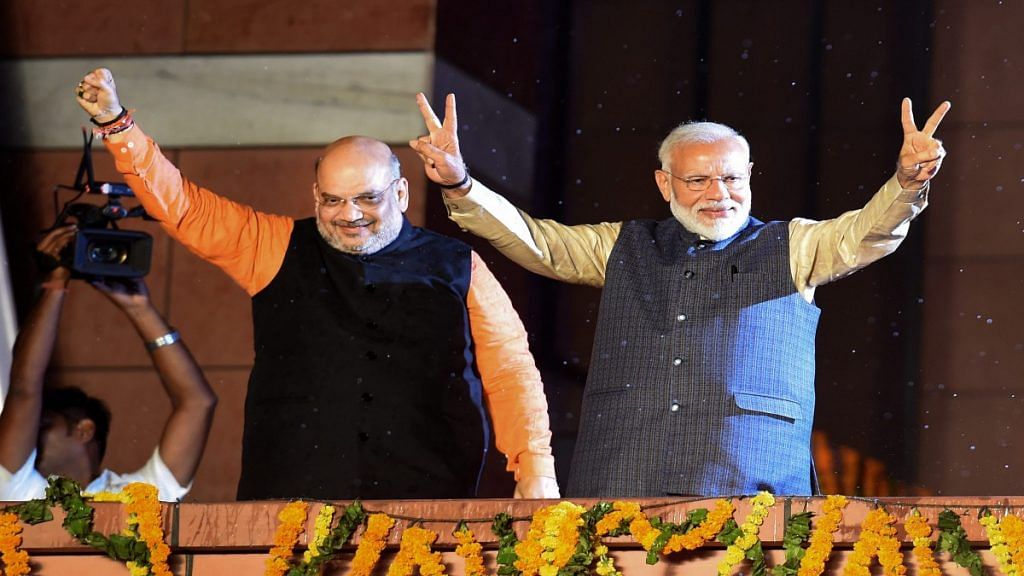New Delhi: The Budget session of Parliament that ended Wednesday settled one issue once and for all: Amit Shah is the No. 2 in Narendra Modi government and his putative successor, too.
The 54-day session had Shah written all over it: The home minister who “integrated” Jammu & Kashmir with India by invalidating Article 370; the strategist who perfected Chankaya’s saam-daam-dand-bhed theory to pulverise the opposition and turn the numerical minority of the treasury benches in the Rajya Sabha into a virtual majority and the counter-terror face of the government that wanted and got the powers to declare individuals as terrorists.
There were many firsts in the first Budget session of the new Modi government.
Speaker Om Birla set a record by getting 35 bills passed by the Lok Sabha, 11 more than what G.V. Mavalankar of the first Lok Sabha managed in 1952.
The choice of Birla, a two-term MP, as the Speaker had surprised many but he proved the sceptics wrong by ensuring smooth, disruption-free functioning of the Lok Sabha. Even opposition leader Adhir Ranjan Choudhury said he would emerge as the best Speaker in Commonwealth countries. If Birla as a tough, no-nonsense Speaker came as a revelation to many, the credit goes to Shah who, along with Modi, chose him for the coveted post.
Broadly, there are three takeaways from the Budget session.
Also read: Amit Shah tells Lok Sabha J&K also means PoK & Aksai Chin, ready to die for this
Clarity on de facto No 2 in Modi government
When Rajnath Singh was sworn in after Modi on 30 May, it was assumed that he was the de facto No. 2 in the Union Cabinet. After all, during Modi’s first stint, Singh had presided over the meetings of the Cabinet on a couple of occasions when the prime minister was travelling abroad. But the first indication of the changed pecking order came within a week as Shah presided over an inter-ministerial meeting on the petroleum sector in his North Block office. He was soon heading many Cabinet committees.
The Budget session sent out the unambiguous message that it’s Shah, and not Singh, who is No 2. The BJP president led from the front in both Houses of Parliament, marshalling NDA MPs, piloting bills, holding parliamentarians in thrall with powerful speeches, making frequent interventions and getting regional parties to fall in line to support the government’s agenda.
The Treasury Benches were always packed to their capacities whenever Shah was present, a privilege Singh seldom had. None of the ministers had a clue about his Article 370 plan until the Cabinet meeting barely 90 minutes before Shah unveiled his agenda in the Rajya Sabha.
NDA in control of Parliament
The NDA may be in a minority in the Rajya Sabha but Shah has ensured that it wouldn’t be a hurdle any more. Think of the Congress staging a walkout during voting on the RTI (Amendment) Bill, which would significantly dilute what is essentially a Sonia Gandhi legacy.
But the principal opposition party had been checkmated by Shah who co-opted regional parties such as the YSRCP, the TRS and the BJD. When the Triple Talaq Bill came up for passage, the Congress found itself abandoned again by regional parties. The opposition’s morale was already down by a series of defections and resignations by its MPs; many more continued to call on Shah until the last week of the session. As it turned out, the home minister was using these bills as a dry run to test the opposition’s numerical strength before he moved on to Article 370.
Also read: Nothing wrong with Amit Shah’s new UAPA. Congress must decide if it wants India to be secure
Contentious bills done, reforms on future agenda
As the NDA looks well-ensconced in Parliament, all eyes are on two other core agendas of the BJP — the uniform civil code (UCC) and the construction of the Ram temple in Ayodhya. Given the way the opposition caved in on the Triple Talaq Bill, the implementation of the UCC may be just a matter of time and political convenience.
The BJP and the government are also keenly watching the proceedings in the Supreme Court over the Ayodhya title dispute. Whatever be the ruling, the BJP-led regime may take comfort in its new-found ability to play the numerical game in Parliament, especially when the Congress and other opposition parties have shown a crisis of conviction and jitters over sensitive issues.
A senior BJP leader told ThePrint that the government was also taking a hard look at the “discriminatory” privileges enjoyed by minority educational institutions.
Having disposed of the politically contentious issues, economic reforms requiring parliamentary approval are on the government’s agenda, say BJP leaders.
One of the priority items would be the four labour codes (after the merger of 44 labour laws). The Lok Sabha has passed the Code on Wages Bill, which is likely to be tabled in the Rajya Sabha in the next session of Parliament. The other three are also said to be on the priority list.
BJP sources also claim that the government is giving a re-look at the land acquisition bill.
“We just wanted to get over with politically-disputed bills in the very first session when the opposition parties are demoralised. Those done, I understand the government’s entire focus will be on the economy,” a BJP MP told ThePrint Monday.
Also read: By scrapping Article 370, Modi is going for a failed European model of nation building
